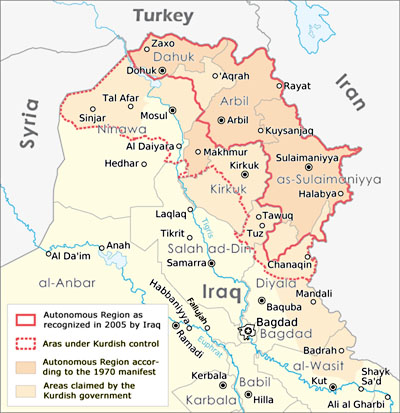Why did President Obama decide to re-engage militarily in Iraq? Was it to prevent the genocide of the Yazidi religious minority trapped on Mt. Sinjar? Partly, perhaps, but Max Fischer writes that the  real motivation was to protect Iraq’s northern Kurds:
real motivation was to protect Iraq’s northern Kurds:
If you are a member of ISIS, here is how you might hear Obama’s message: Stay away from Iraqi Kurdistan, and the rest of northern Iraq is yours to keep. Based on Obama’s words and actions so far, you would not be so wrong.
….Invading Iraq’s Kurdish region, it turned out, was Obama’s red line for ISIS. There are a few reasons why. The Kurdish region is far stabler, politically, than the rest of Iraq. (Kurds are ethnically distinct from the rest of Iraq, which is largely ethnic Arab; most Kurds are Sunni Muslims.) The Kurdish region, which has been semi-autonomous since the United States invaded in 2003 and has grown more autonomous from Baghdad ever since, also happens to be a much more reliable US ally than is the central Iraqi government. It has a reasonably competent government and military, unlike the central Iraqi government, which is volatile, unstable, deeply corrupt, and increasingly authoritarian.
….On a background briefing call with White House officials late on Thursday, the emphasis on defending Erbil came through loud and clear: the US is clearly designing its intervention around protecting the Kurdish region; any effect for the rest of Iraq is secondary, and was premised on Iraq’s government first fulfilling some political commitments.
The effect, though, is to imply that the US will not intervene against ISIS if they remain on the correct side of the red line — effectively giving them the US go-ahead to continue terrorizing the vast territory in northern Iraq they’ve already seized.
In the Middle East, red lines don’t always work so well. This one will obviously depend to a large degree on how competent the Kurdish militias turn out to be, and whether they can repel the ISIS troops with nothing more than a modest amount of aerial support from the US. Given the small size of the ISIS forces, and the reputation of the Kurdish Peshmerga, this certainly ought to be feasible. If even the Kurds are having trouble against ISIS, however, this suggests that ISIS is considerably stronger than anyone thought. Stay tuned.

















